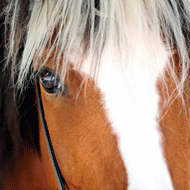UK to introduce central equine database

Last year, bute was found in horse carcasses for human consumption.
The UK will introduce a central equine database to improve the horse passport system after its flaws were revealed in last year's horse meat scandal.
EU member states have endorsed proposals for a more robust and enforceable equine identification system.
The move has been welcomed by the Equine Sector Council as "a big step forward for horse welfare in the UK and Europe".
Concerns about the passport system have abounded since the horse meat scandal, which broke early last year when UK food products labelled as beef were found to contain horse meat.
Further testing found the painkiller phenylbutazone (bute) to be present in some horse carcasses, some of which may have entered the food chain.
In February 2013, it was reported that flaws in the system, which allows more than 70 equine organisations to issue passports, had resulted in as many as 7,000 unauthorised passports to circulate in the UK since 2008. The findings led to concerns that widespread abuse of the system was allowing drugs to enter the food chain.
Commenting on the introduction of a central equine database, council chair Jeanette Allen said: "The new regulations are a triumph for Britain’s horse sector and Defra who have worked closely and collaboratively together to ensure a better system for equine identification.
"More robust standards of documentation and a central database in every European country will help to reduce fraud and improve traceability, owner accountability and disease control planning across the European Union – so helping to protect the valuable horse sector."
While she believes the new rules will help, Jeanette said they "will not solve the problem" unless it is enforced.
"We will now focus on working with Defra so that they create a central database that is fit for purpose, introduce batch-controlled retrospective microchipping of all horses and ponies and fixed penalties for non-compliance.
"Government must also support better enforcement which has been a low priority. We look forward to discussing all of these issues with Defra and continuing to work with them on a brighter future for horses in the UK."
World Horse Welfare's chief executive Roly Owers said horses in the UK will benefit particularly from the tougher laws.
"One of the key horse welfare challenges we have is linking a horse to an owner and an overall lack of compliance and enforcement. With more than 75 passport issuing organisations of varying standards and no central database, finding a horse’s owner and enforcing the regulations was effectively impossible.
"We have always been clear that a central database is a fundamental element in building a system that is more workable and enforceable, which can better protect our horses. Now we need to make sure the revised UK regulation maximises compliance, something that has been shockingly low up in many areas until now."



 Zoetis has launched a new survey to identify management techniques for Equine Herpes Virus (EHV).
Zoetis has launched a new survey to identify management techniques for Equine Herpes Virus (EHV).